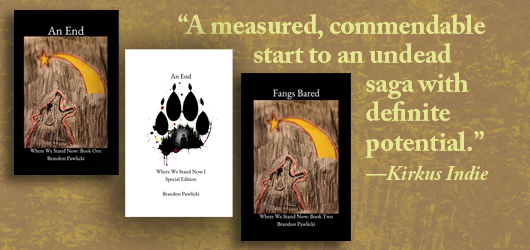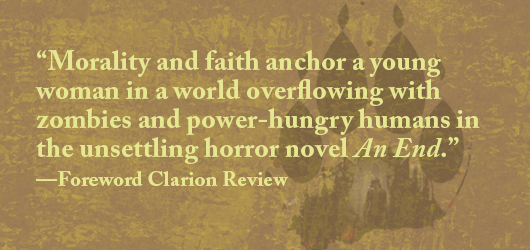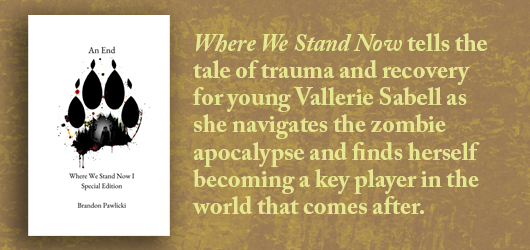New beginnings...and zombies
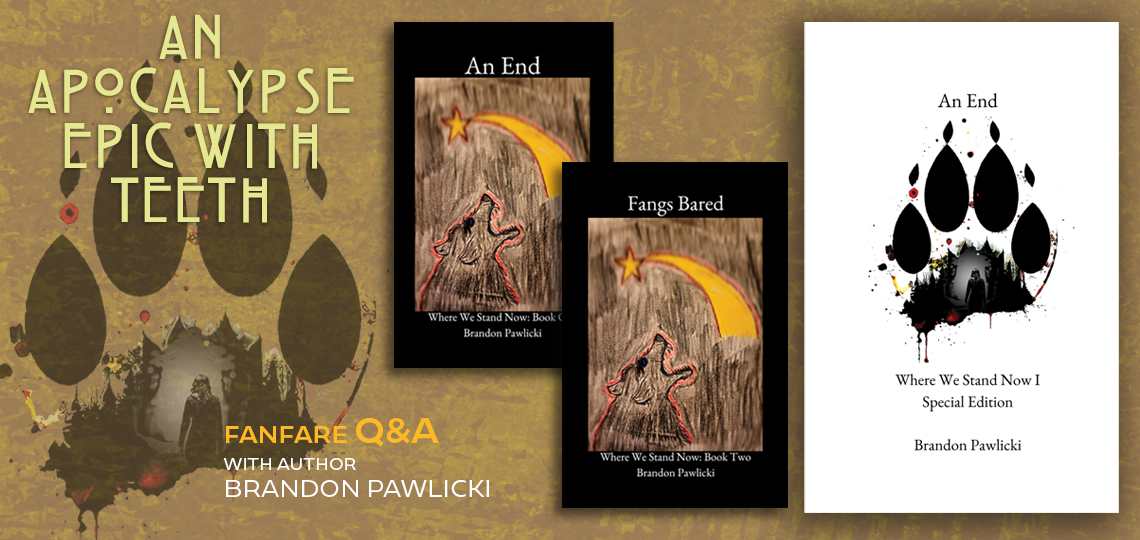
Reviewer John Murray Interviews Brandon Pawlicki, Author of An End: Special Edition
He said he’d never do it, but the challenge of executing a well written, thrilling zombie Fantasy was just too enticing—and, in An End, we’d be the first to admit that Brandon Pawlicki pulled it off.
In his recent Clarion review of An End, John Murray describes a “world overflowing with zombies and power-hungry humans, among whom a young woman is anchored by her morality and faith. … following Vallerie through this world is an unforgettable experience.” That her spiritual beliefs are Wiccan based only makes this zombie horror story—and the promise of additional books in the series—that much more intriguing.
Have you always wanted to tackle the zombie genre and what are your plans for the series?
I’ve wanted to try my hand at writing a series for a while, but the zombie aspect actually came into play later on. There were a few apocalypse-related stories that I’d found myself really invested in due to their human-focused drama. Before discovering those, I was actually never a fan of zombies, end of the world scenarios, and the like. Most of them just felt way too silly for my taste. These particular stories, however, drew me in, and it was because they shifted the focus more onto the survivors—their stories, their relationships, their goals in what was left of the world. They also gave the world, to the degree that they could anyway, a more grounded feel, and that added some extra weight to things.
To make a long story short, all of those stories, in my opinion, ended up taking a huge nosedive in terms of their quality of writing. Events came to take place that made very little sense compared to what came before. Characters that seemed pivotal to the plot were killed off, usually in ways that contradicted their survival skills. New characters were given the spotlight, but were never expanded on enough to a point where I felt that I had any real understanding of or connection to them. And regarding the zombies, they too experienced a shift. They became more present, but less of a threat. Despite them somehow being able to get the jump on so many experienced survivors, a simple wack to the head was enough to completely destroy them. To make it all the worse, these shifts seemed to always occur right when things had started to get really intense, right at the height of engagement.
All of this bothered me so much that I felt the need to try my own hand at things. I felt that, at the very least, I could come up with something that would feel more consistent and less frustrating for an audience. Especially so, given the ease of access to self-publishing these days and the expansive nature of books. Little did I know at the time just how connected I’d get to that kernel of an idea, as it would soon spawn what’s planned to be a six-book plotline.
I suppose, in short, you could say that I took pettiness to its highest degree, what with deciding to write a whole book series because I was mad at how other stories turned out. I’m happy with my decision, though, and I think it’s set me forth on a wonderful and fulfilling journey. I’m hopeful that fans of the genre, and fans of character-driven stories in general, will find something worthwhile here. I don’t want to reveal too much, but there is indeed a plan, and what’s to come is going to get very intense. I have an ending set in stone that I think, when all is said and done, will leave readers quite satisfied.
What prompted the decision to have Vallerie a practicing Wiccan, and then having her confront a lapse in faith in the aftermath of her coma and the apocalypse?
I, myself actually stumbled into Wicca around the time I’d started tinkering with the initial story. I was at a bit of a roadblock with my writing where I didn’t yet have a hook for my protagonist or even a full journey to put her on. Wicca ended up becoming that missing piece. I found something to believe in for myself, and, simultaneously, I found the missing piece for Vallerie’s character and the story overall. It was like a delicate whisper entered my ear. Divine intervention, perhaps? It seemed like a playground of potential for me. To pit someone with a code such as “do no harm” against something as inherently harmful as the zombie apocalypse just seemed like a naturally intriguing direction to take things.
Vallerie’s faith is very important to her, but as her story unfolds, she comes to learn that faith, like life, may not be as simple as a three-word code. It’s a journey of finding balance in a new world and a new life that seems intent on knocking you off balance at every turn.
A recurring element in zombie stories is that other survivors are just as deadly as the walking undead. What was your inspiration for the major human conflict to be between Vallerie and a militant group?
The Bastion ended up becoming the perfect challenge for Vallerie as they directly threatened not just her, but her faith and her ideas about how the world should be. An early scene in An End, before the apocalypse hits, sees Vallerie mention in therapy that she wants to help fix the wrongs of the world, as she sees them. She makes mention, too, of her belief that anyone with any real power or influence to do so isn’t doing enough or anything at all. The Bastion exists to do just that sort of fixing, but, as the first book reveals, their ideals and Vallerie’s, while ultimately focused on the same destination, are on vastly different tracks. They have different ideas of how to get there, and they’re just too different to coexist.
It was also a sort of trial by fire to place Vallerie in such a place as to be in direct conflict with a military force. By the time this group is introduced, we’ve been with Vallerie for a while, and so we’re immediately concerned for her safety. Who are these people? Can they be reasoned with? And, as our protagonist ends up in conflict with them, how in the hell is she going to manage against that kind of power and presence? It’s not the only conflict in the series, but it seemed to me to be the perfect one to kick things off with. I’m hoping that readers agree and feel the same sense of anxiety for the characters that I did while writing.
What was the relevance of having Vallerie endure so much hardship only to be in a coma when the apocalypse kicks off?
The coma was born of a few things. The interesting reason is more symbolic. There are a few times in An End where reference is made to the apocalypse as being a sort of fresh start, both for the remains of civilization and for Vallerie. She has endured quite a lot before that point, and things seemed to be on a fast track toward flat-out failure for her and her brother. When she comes to, however, almost all of those issues are no more. Yes, the world from before came to an end, but with that, so, too, did the worry of such things like income, bills, societal and social obligations. The apocalypse, for Vallerie, serves as a fresh start, and so waking up in it seemed like a good fit for her thematically.
A funnier note on that, I think, is that she really did need the rest. She’s a character that is constantly thinking she has to think, act, do, and generally, keep moving. And, she did, after all, have issues sleeping well at the time anyway. So hey, she got to rest for a bit and that’s certainly beneficial if the end of the world is due to hit.
Now for the less interesting reason. I tried a few different approaches that included Vallerie actually witnessing the eventual collapse of things. I felt that a lot of that ended up being pretty unnecessary, though. We’ve seen much of it already so many times, it seems like, and I thought maybe readers would appreciate “getting on” with the story. And honestly, as I was writing, I was pretty bored by all of that, too. I got caught in this whirlwind of showcasing police chaos, military chaos, civilian panic, and the like when I really just wanted to focus on Vallerie. Taking the direct approach, I felt I was forced to show and explain so much that it distracted from the character piece I set out to write. And so, while it’s perhaps not the most original idea, a coma turned out to be a nice way for me to get around all that. As a neat little consequence, it also gave me the freedom to tease out exactly what might’ve happened as the series goes on. And that’s a lot of fun.
Was any of the novel pulled from your life or experiences?
There are a few bits and pieces to the characters and events that I drew real life inspiration from, but other than Vallerie’s faith and her feeling of somewhat being stuck in life, most of the story is purely fictional.
Was there any part of the book that was particularly challenging to write?
Absolutely. As mentioned, the initial beginnings of the story were quite challenging. Before finding Wicca and adding that into the mix, I had a beginning and an ending for a first book, but after the very first scene, it seemed like the whole thing became writer’s block Hell. I had the initial story set several years into things, and Vallerie and her brother were living with a group. She retained her gentle nature and Allan retained his harsher one. But I just couldn’t think of a plot to sandwich them in to save my life. And then there’s the issue I encountered with trying to showcase the fall of things. Other than that, though, everything else seemed to come along fairly easily, and continues to.
What did you edit out of the book and why was it cut?
There were a few small scenes that I did away with, but none of them were really all that important. There was one scene I miss between Vallerie and Allan. They were just attacked and were left on opposite ends of an abandoned car. It was meant as a show of their different attitudes toward people and survival and it involved Vallerie scolding her brother for continuing his assault on a long-dead attacker. Ultimately, I didn’t really need it and it would’ve required some finagling to fit it in with the pace of the book anyway.
Now that I’m thinking back a bit more, though, there was another scene where Vallerie was getting upset while watching the news that I really liked. I believe this was after her head injury. Allan comforts her and they have a heart to heart about how the weight of the world isn’t her burden to bear or something to that end. I scrapped that scene, but retained a hint of it in a few others in the first chapter. The whole point was to show that Vallerie getting too involved with current events just makes her upset and that it’s all too much for her to process. I think that came across well in the book as it is now.
What part do reviews/critiques of your work play in your writing process?
It’s all very important to me. I’ve used the feedback I’ve gotten to refine my craft. And you all at Foreword have played an integral part in that with your review and editing services. To any writers out there that might be reading right now, I cannot stress this enough. Do not give up. Ever. Feedback, positive or negative, is a tool, and having extra tools can only help you and your work.
What are you working on next?
Where We Stand Now is really all I’m intent on currently. I’m working on the third book, refining the outlines for four through six, and mapping out plans to do special commentary releases for each alongside the main editions, just as I’ve done for An End. I’ve found that my passion as a writer truly resides in this story and so I’m putting everything I have into ensuring that the series gets finished according to plan and to its fullest potential.
As a quick aside, I’ve even just recently gotten a teaser trailer made for An End, and I think it turned out quite well. I’ll actually be having it run in my local theaters all through December, so that’s definitely adding some creative fuel to my fire.
Of course, the future doesn’t come until it comes, so I may end up working on another story at some point. But really, this one just has everything I’m passionate about. Drama. Horror. A touch of fantasy. Moral dilemmas. And glorious, glorious, fun-to-write violence. And a protagonist that I’ve grown quite attached to. I really can’t imagine leaving her behind. At least not for a long while.
AN END
WHERE WE STAND NOW: BOOK ONE | SPECIAL EDITION
Brandon Pawlicki
Clarion Rating: 4 out of 5
Morality and faith anchor a young woman in a world overflowing with zombies and power-hungry humans in the unsettling horror novel An End.
In Brandon Pawlicki’s horror novel An End, a woman awakens from a coma into a zombie apocalypse that challenges her rigid morals.
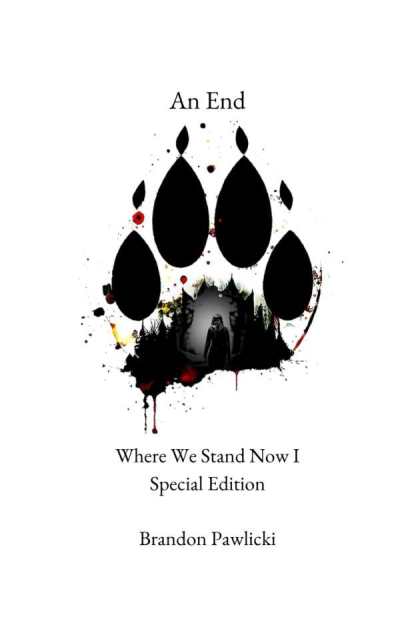
Vallerie and her boyfriend find solace in Wiccan rituals—until a school shooting interrupts a protective ceremony they’re performing. Vallerie and her brother survive the shooting, but her life spirals downward despite her best efforts at maintaining normalcy. She struggles to keep a job; she deals with anxiety and nightmares. Later, she faces a vicious attack from someone who holds her responsible for the school massacre; the event leaves her in a coma.
The horrors of the school shooting foreshadow the zombie-led difficulties awaiting Vallerie after she emerges from her coma. Her brother and a friend usher her from immediate danger, but she learns that civilization as she knew it has crumbled—and that her brother is being pursued by a vindictive military force as well.
Zombies and soldiers aside, Vallerie also contends with her weakening faith and traumatic past. Her once steadfast moral code is undermined by the methods that are required of her if she is to protect herself and her allies. Indeed, the mortal threats that she faces become secondary to her own personal growth.
The book maintains a consistent pace when it’s focusing on the three leads and their interactions with each other in the present. However, its momentum is compromised by its occasional deviations to focus on details from Vallerie’s life before the apocalypse; these forays become redundant. And while Vallerie is an engaging heroine who is prone to deliver well-developed reflections and flashbacks, the book’s focus on her perspective is limiting. Even when she encounters other survivors who could be allies, they express the hope that the zombie threat will die out on its own, limiting their contributions.
The book’s three central heroes are well fleshed out, though their opponents are developed in more superficial terms: what’s most known about them is their drive to grow in power and punish those who stand in the way of that goal. Still, following Vallerie through this world is an unforgettable experience, and the story ends with the tantalizing potential for future adventures. This special edition volume includes intriguing author commentary regarding the story’s origins and development.
The unsettling horror novel An End is set in a world overflowing with zombies and power-hungry humans, among whom a young woman is anchored by her morality and faith.
Reviewed by John M. Murray
John M. Murray

